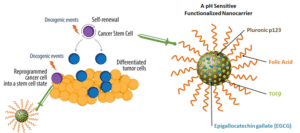
Cancer stem cells (CSCs) represent a minor population of cells within tumors, distinguished by their ability to self-renew and proliferate indefinitely. These cells are implicated in tumorigenesis, metastasis, and the maintenance of tumor heterogeneity. Consequently, the development of targeted therapies aimed at CSCs is promising for enhancing the survival rates and quality of life for individuals diagnosed with cancer.
Melanoma is a form of skin cancer that arises from the uncontrolled proliferation of melanocytes. Although melanoma is less prevalent than other skin cancer types, it is recognized as the most aggressive form and is associated with a significant mortality risk. If not detected and treated promptly, melanoma has a heightened propensity to metastasize to distant sites in the body.
The secreted protein transforming growth factor-beta (TGFβ) is crucial in regulating various cellular processes, including growth and differentiation, in both normal and cancerous cells. In the context of melanoma, recent research has shown that TGFβ functions as a powerful tumor suppressor by inhibiting cell cycle progression and promoting apoptosis. Epigallocatechin gallate (EGCG) is a polyphenol, the most abundant catechin in tea, which is shown to have a suppressive effect on cancer stem cells by cGMP induction.
Considering the aforementioned scenarios, the application of a pH-sensitive nanocarrier that incorporates TGFβ may play a significant role in the management of melanoma by inhibiting cancer stem cells. This nanocarrier is a micelle, made from an amphiphilic polymer called Pluronic p123. This micelle is modified with a pH-sensitive conjugator, which gives a pH-responsive nature to the micelle. In addition, Pluronic p123 based micelle can be functionalized with folic acid to specifically interact with the folate receptor present on melanoma cells, thereby facilitating targeted therapeutic delivery. Furthermore, the pH-sensitive nature of the nanocarrier enables the controlled release of TGFβ and EGCG within the cellular environment, potentially enhancing the overall efficacy of drug delivery.
